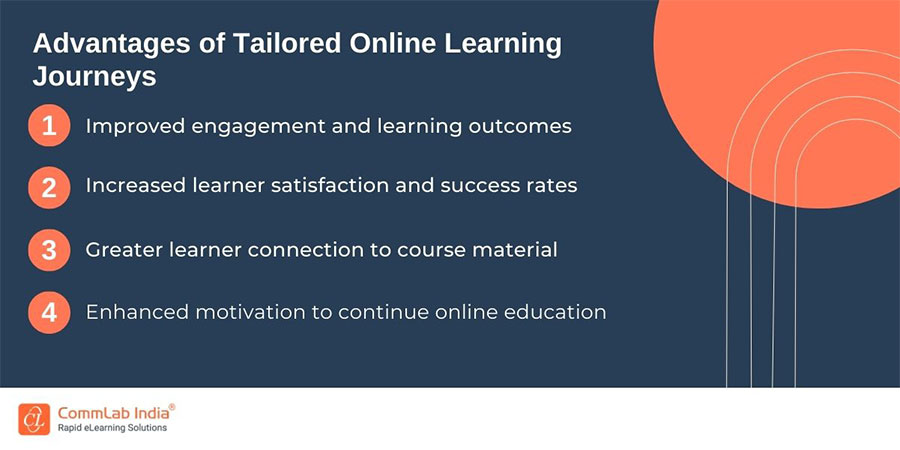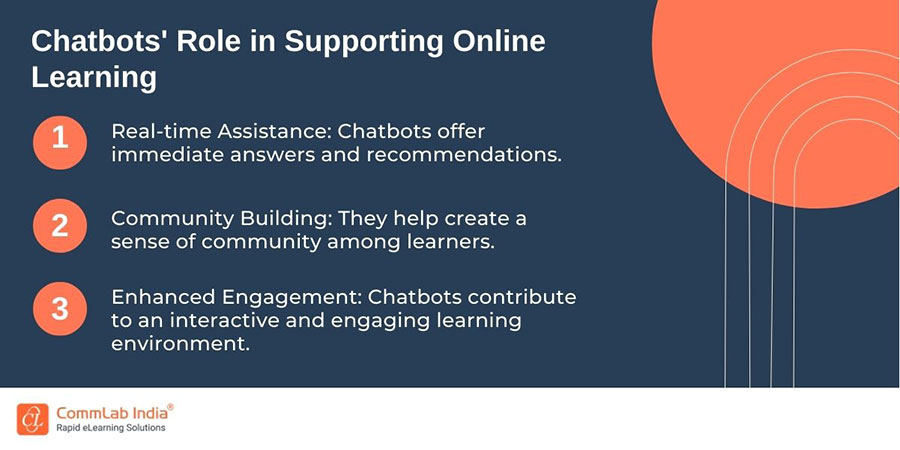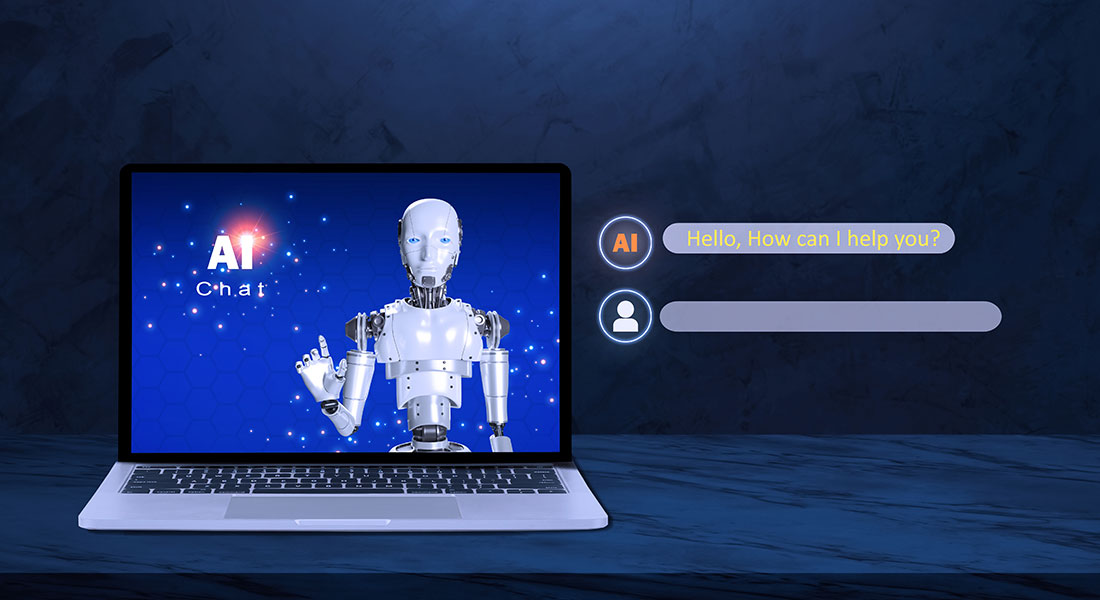How AI is Transforming Online Learning – An Overview

In recent years, the integration of artificial intelligence (AI) into corporate training and employee development has revolutionized how learning is delivered and experienced. This blog discusses the role of AI in making online learning more effective, engaging, and personalized. It also discusses the evolving responsibilities of Learning and Development (L&D) professionals in the realm of corporate training. Let's get started
What is the Role of AI in Online Learning?
AI in online learning leverages artificial intelligence (AI) technologies to create a more personalized and effective learning experience. This includes tailoring content, assessments, and support through AI-driven insights, making training more engaging and efficient. It's a game-changer for organizations seeking to enhance employee skills and knowledge in a flexible and accessible manner.
Here are the different ways AI is revolutionizing online training:
How AI is Revolutionizing Online Learning
AI-Enhanced Content Creation for Online Learning
AI-driven content creation is transforming how online training materials such as custom eLearning resources are developed. Machine learning algorithms analyze learner data and adapt content, ensuring that it's relevant and engaging. This personalization boosts learner engagement and knowledge retention.
Tools and Platforms for Automated Content Creation
There are a lot of AI-powered tools and platforms that help automate content creation. These tools can generate text, create multimedia content, and even design custom quizzes and assessments, reducing the time and effort required to produce high-quality learning materials.
Some of these tools include:
- Articulate Rise: Articulate Rise is an eLearning authoring tool that uses AI to simplify course creation. It offers templates for various learning formats and adapts content to different devices.
- Lumen5: Lumen5 is a video content creation platform that uses AI to turn text content into engaging video presentations, making it ideal for training materials and presentations.
- GPT-3: OpenAI's GPT-3 is a powerful language model that can generate text, answer questions, and provide explanations. It's used in chatbots and content generation tools.
- Canva: Canva uses AI to help users design visually appealing training materials, including infographics, posters, and presentations.
Personalized Online Learning Experiences
AI-driven algorithms can assess learners' strengths and weaknesses, tailoring content and learning paths to their specific needs. This personalization optimizes the learning journey and enables learners to progress at their own pace.
Advantages of Tailored Online Learning Journeys

Strategies for Implementing Personalization in Online Learning
- Data-driven Profiling: Analyze learner data to create personalized profiles.
- Adaptive Learning: Adjust content based on individual progress.
- Recommendation Engines: Suggest relevant courses and modules.
- Instant Feedback: Provide personalized feedback on assignments.
- Flexible Learning Paths: Let learners choose their paths within the curriculum.
Data-Driven Insights for Online Learning
AI algorithms collect and analyze vast amounts of data generated by employees learning online. This data provides valuable insights into their behavior, performance, and preferences, enabling instructors to make data-driven decisions. Understand how AI can go beyond basic analytics to provide deeper insights into individual and group performance. This data can be used to identify at-risk learners and develop interventions to improve outcomes.
Ways to Use Data-Driven Decision-Making in Online Learning
- Explore best practices for using data to inform instructional design.
- Make data-driven decisions for online learning initiatives.
- Improve courses and allocate resources effectively based on insights.
- Leverage data to enhance the success of online learning programs.
Gamification and AI in Online Learning
Gamification, the use of game-like elements in learning, has proven highly effective in keeping online learners engaged. When combined with AI, it becomes even more potent. AI can adapt gamified elements based on individual preferences, making the learning experience more enjoyable and rewarding.
Best Practices for Incorporating Gamification in Online Learning
- Clear Learning Objectives: Ensure gamified elements align with specific learning goals.
- Engaging Storytelling: Use narratives and themes to make learning more captivating.
- Rewards and Recognition: Implement rewards for achievements to motivate learners.
- Competition and Collaboration: Balance competitive and collaborative game elements for varied engagement.
- Feedback and Progress Tracking: Provide instant feedback and progress tracking to guide learners effectively.
→ Download Now: The State of Learning – Now and Beyond [eBook]
Virtual Instructors and Chatbots in Online Learning
AI-powered virtual instructors are becoming integral in online learning. These virtual mentors provide instant guidance, answer questions, and assist learners, enhancing the overall experience by offering personalized support.
Chatbots' Role in Supporting Online Learning

While these were significant impacts of AI on online learning, let us see what the future holds...
What are the Future Trends in AI-Enhanced Online Learning
Future trends in AI-enhanced online corporate training are set to transform the way businesses develop their workforce. Here are several key trends to watch for:
1. AI-Driven Learning Pathways: Hyper-personalization in corporate training will become the norm, with AI tailoring learning pathways to individual employees. This will optimize engagement, skills development, and knowledge retention.
2. Mixed Reality and VR Integration: The adoption of virtual and augmented reality will create immersive, hands-on learning experiences. Businesses will use these technologies to simulate real-world scenarios, enhancing employee training in areas like technical skills and safety procedures.
3. Advanced Data Analytics: AI-powered data analytics will offer deeper insights into employee performance. Businesses will use these insights to refine their training programs, identify high-potential talent, and implement targeted interventions.
4. Automation of Training Administration: Routine administrative tasks such as tracking employee progress, scheduling training sessions, and generating reports will be automated, allowing L&D professionals to focus on strategic program development and support.
5. AI-Generated Training Content: AI algorithms will continue to produce high-quality, customized training materials, reducing content creation costs and ensuring that employees have access to the latest, most relevant information.
6. Ethical AI Training: The ethical implications of AI in corporate training will become a core component of employee education. Companies will educate their workforce on responsible AI use, data privacy, and ethical considerations in AI-driven decision-making.
7. Global Learning Networks: AI will facilitate the creation of global learning networks, connecting employees and trainers across geographical boundaries. This will encourage collaboration, knowledge sharing, and diverse perspectives in corporate training.
8. Continuous Skill Assessment: AI will enable real-time skill assessment, allowing companies to assess their workforce's capabilities and provide immediate feedback for continuous skill development.
Summing Up
In summary, AI is significantly transforming the future of online learning. It's doing so by personalizing learning experiences, automating content creation, and providing valuable data insights. As L&D professionals, it is important to embrace AI to stay competitive and to conquer the future of learning.
Wondering about the other futuristic strategies to embrace to stay ahead in 2024 and beyond? Start with understanding the state of learning. Here is an eBook to help you!
Download Now.





